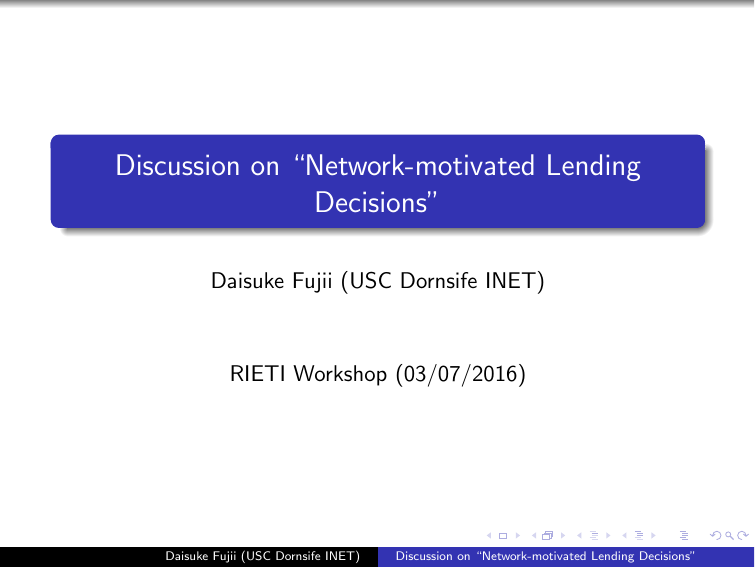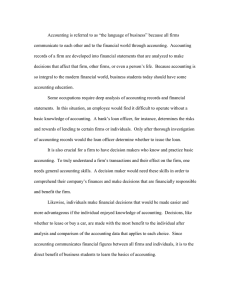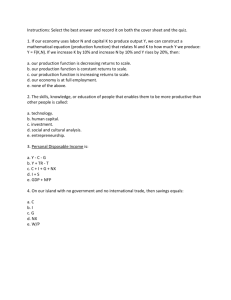Discussion on “Network-motivated Lending Decisions” Daisuke Fujii (USC Dornsife INET) RIETI Workshop (03/07/2016)
advertisement

Discussion on “Network-motivated Lending
Decisions”
Daisuke Fujii (USC Dornsife INET)
RIETI Workshop (03/07/2016)
Daisuke Fujii (USC Dornsife INET)
Discussion on “Network-motivated Lending Decisions”
Summary
Question: Do banks internalize the positive externality of
“central” firms by forbearance?
Model: inter-connected firms through intermediate inputs
(production) + a monopolistic bank’s decision to which firms
it extends loans (finance)
Data: Japanese inter-firm transaction network data (for
centrality) + firm-level financial data (for interest rates)
Empirics: OLS on interest rates and centrality
Results: well-connected (central) firms get lower interest rates
Daisuke Fujii (USC Dornsife INET)
Discussion on “Network-motivated Lending Decisions”
Contribution
New theory and empirical results on production networks
and corporate finance
New insight on on the value of firms: centrality
Related to many important questions:
assessment of “zombie lending” during Japan’s lost
two decades
resource misallocation and aggregate productivity
bailout
Daisuke Fujii (USC Dornsife INET)
Discussion on “Network-motivated Lending Decisions”
Model
A representative household owns a monopolistic bank and
consumes goods (endowment economy)
The bank determines which firms should operate to maximize
the aggregate output
Firms which received loans from the bank can produce using
intermediated goods produced by other firms (network)
CES preferences and technology –> homotheticity –> system
of linear equations
Discrete network + extensive margin adjustment –> multiple
equilibria, difficult to solve
Daisuke Fujii (USC Dornsife INET)
Discussion on “Network-motivated Lending Decisions”
Key equations
1
Network matrix determines the centrality of firms
v 0 = 10 (I
2
1
Bank’s problem
max
{ei }
3
Q)
X
Rational forbearance
i
2
e i 4 ⇡i
|{z}
profit
ei = 1 even though ⇡i
3
(1 + ⇢) Fi 5
| {z }
cost
(1 + ⇢) Fi < 0
P @⇡
because j6=i @eij > 0 (positive externality of firm i). This
externality is increasing in vi , the centrality of firm i
Daisuke Fujii (USC Dornsife INET)
Discussion on “Network-motivated Lending Decisions”
Empirics
Japanese inter-firm transaction network data –> estimate
centrality (influence coefficient)
Regress interest rate on centrality, credit score and other
control variables including industry and regional dummies.
Di↵erential e↵ect of centrality depending on credit-worthiness
The e↵ect of centrality should be stronger for firms whose
main bank is a regional bank
Daisuke Fujii (USC Dornsife INET)
Discussion on “Network-motivated Lending Decisions”
Results
1
High centrality lowers interest rate
2
This e↵ect is stronger for less credit-worthy firms (interaction
term is positive)
3
This e↵ect is stronger for firms whose main bank is a regional
bank (more monopolistic power)
Daisuke Fujii (USC Dornsife INET)
Discussion on “Network-motivated Lending Decisions”
Discussions
More robust empirical results are desired
E↵ect of firm exits, network dynamics
A dynamic model and endogenous network formation can be a
fruitful extension
Any policy implications for resource misallocation and
government bailout?
Overall, this is a very interesting and well-written paper
Daisuke Fujii (USC Dornsife INET)
Discussion on “Network-motivated Lending Decisions”




